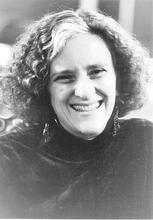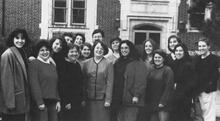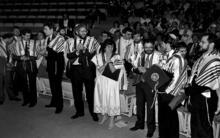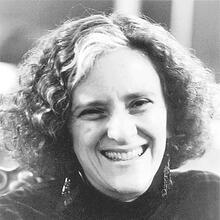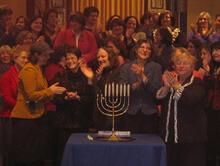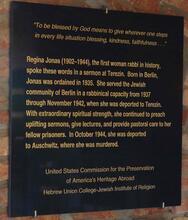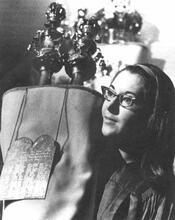Analía Bortz
As the first Latin American woman to be ordained a Conservative rabbi, Analia Bortz merged her identity as Latina with her careers in the rabbinate and medicine to help Latin American Jewish women achieve equality, support women struggling with infertility, and advocate for women and the poor. Her ideas influenced congregations in various parts of Latin America and the United States. One of her main goals is tikkun olam, or repairing the world, which she strives for by establishing diverse organizations around the world to help others, providing advice to those who feel despair, and sharing her knowledge in medicine and religion to make this world a better place. Her charisma and empathy have touched the lives of many people around the globe.
Introduction
The ordination of women as rabbis within the Conservative movement is a fairly new phenomenon. The first ordination took place in the United States in May 1985, when Amy Eilberg became “Ha’Rav Chana Beyla,” fulfilling the role of rabbi, teacher, and preacher among the Jewish people. Nine years later, in 1994, Analía Bortz became the first Latin American woman rabbi.
Bortz was born on February 4, 1967, in Buenos Aires to doctor parents Isaac and Esther Bortz, both Ashkenazi Jews, and was raised in a Jewish and Zionist household. Upon finishing her high school studies at the Jewish Instituto Integral Modelo Argentino Rambam, she started medical school in 1985 at the University of Buenos Aires, following her family tradition of becoming medical doctors.
Road to Ordination
Early on her medical studies, Bortz felt that she was learning about human anatomy and physiology but was missing knowledge of the soul and essence of humankind. She decided to search for the answers to human nature within Judaism. At first, she enrolled in Abarbanel (part of the Seminario Rabínico Latinoamericano, or Latin American Rabbinical Seminary, in Buenos Aires), a school that trains teachers in Jewish subjects, as the idea of becoming a rabbi did not occur to her. She considered her Jewish studies to be a “hobby” while she attended medical school. But Bortz fell in love with Judaism, in particular Jewish sources and texts, learning and analyzing them in a critical way from different points of view, something that, for her, was very different from the more rigid learning of medicine.
After a year studying at Abarbanel, Bortz decided to enroll in rabbinical school at the Seminario Rabínico Latinoamericano, the center for Conservative Judaism for Latin America, where she set a new precedent for female involvement. At that time, the road to rabbinical ordination at the Seminario included three years of study at Abarbanel and then more years of study at Heschel, the Seminario’s rabbinical school. Coincidentally, the words of Rabbi Abraham Joshua Heschel inspired Bortz to enroll in rabbinical school: "Religion is medicine in the form of prayer; medicine is prayer in the form of deeds." Even though some women in the United States had already been ordained as rabbis in the Reform and Conservative movements, she did not know much about them nor look to them as role models. Instead, she crafted her own model of a woman rabbi.
Bortz’s perseverance, resilience, and eagerness to learn gave her the strength needed to continue her studies both in medical school and at the Seminario. In 1990, she graduated medical school. In March of that same year, she married her high school sweetheart Mario Karpuj, also a rabbinical student. In 1991, she and Rabbi Karpuj welcomed their first daughter, Tamar, and in 1993 the three moved to Jerusalem, in order for her to finish her rabbinical studies at Machon Shechter, Beit Midrash Le’Limudei a Yahadut. (To be ordained as a Conservative rabbi at the Seminario Rabínico, students need have an academic degree and complete a year of study in Israel, based on the idea that rabbis need both to understand the secular world around them and to immerse themselves in Jewish life in Israel.) At the same time, Bortz also completed the last two years of her medical residency at Hadassah Ein Kerem hospital in Jerusalem. While in Israel, Bortz became a Mohelet, a person who performs circumcisions, continuing to redefine the role of a Latin American Jewish woman. She was the only Latin American woman studying at the seminary in Jerusalem at that time, and in May 1994 she passed the Beit Din (Rabbinical tribunal) in Jerusalem and returned to Buenos Aires to receive her ordination (smichah) at the Seminario.
Offering a Helping Hand in Atlanta
For three years, Rabbis Bortz and Karpuj worked together to lead Atlanta’s Congregation Ahavat Achim. In August 2003, they started a new congregation in Atlanta, naming it Or Chadash as an homage to a congregation with the same name in Buenos Aires where they had both worked. They had a vision of mimicking the Judaism they grew up with in Argentina and wished to bring a “Latin Flavor,” with a close relationship with members of the congregation, resembling a family rather than a congregation. They started the congregation with only 50 individuals, but it later grew to 400 families. Rabbis Bortz and Karpuj incorporated a variety of songs with Latin rhythms and instruments into the liturgy, provided lectures on a wide range of topics in Judaism, set up dedicated events (from honoring members to fundraisers), and opened their home, their dedicated sacred space, to all congregants as if it were their home as well.
In 2005, Bortz also started “Seeds for Hope,” a group to provide a safe haven for Jewish women dealing with fertility issues to talk about infertility. The group helped women understand the challenges they faced in conceiving from both Jewish and medical perspectives and suggested solutions such as surrogacy, frozen embryos, etc. Bortz combined Biblical and Talmudic text study, immersion in the Ritual bathmikveh, and talks with medical professionals to open the women’s minds, hearts, and souls. She believes these activities were able to influence the women’s bodies; some women were able to conceive naturally. Over 200 babies were born after this group started. It has since developed into the Jewish Fertility Foundation of Atlanta and expanded to other cities.
Bortz and her husband also performed the first same-sex marriage ceremony in the Southeast Region in February 2007, following Rabbi Rachel Adler’s model of Brit Ahuvim, or “lovers’ contract,” which is based on Shutafot, a traditional model for partnership.
Awards and Achievements
From 2004 through 2008, Bortz was one of 25 rabbis from the United States who made up the second cohort of the Shalom Hartman Institute’s Rabbinic Leadership Initiative. In 2011 Bortz was recognized by the Greater Jewish Federation of Atlanta with the Jewish Community Hero award for her work with couples dealing with infertility. From 2013 to 2015, she served as a member of the Shalom Hartman Institute’s Rabbinic Advisory Board in Jerusalem and North America. In 2014 she was listed among Tablet Magazine's "Fifteen American Rabbis You Haven't Heard of But Should." In November 2018, the BBC honored her as one of the “One Hundred Most Notable Women” for her work with women struggling with infertility. Between 2019 and 2020, she held an American Jewish World Service Global Justice Fellowship, traveling to Guatemala to learn from grassroots activists how to overcome poverty and injustice. In 2021 she received an Honorary Doctorate in Divinity from the Jewish Theological Seminary. She has authored several books and academic articles.
A Call to Home and a Retirement?
In 2020, Rabbis Bortz and Karpuj decided to move to Jerusalem, pursuing the dream of making aliyah (immigrating to Israel) and a feeling of “coming home.” After dedicating so many years to working in a congregation, Bortz and her husband liked the idea of slowing down, but she is still constantly working on or towards something—whether traveling and living unique experiences, such as meditating with Buddhist monks in Laos, crossing the Alps and Pyrenees by foot as a pilgrim, walking the Camino de Santiago in Spain, or continuing her personal education and growth.
Since 2022, Bortz has taught remotely at the Seminario Rabínico Latinoamericano. In 2023, embracing her passion for learning in a new culture, she was accepted at the University of Judaic Studies Or-ZSE, Hungary, to pursue a PhD in Jewish Religious Studies. In 2024, she became Founding Director of the Center for Ethics at the Instituto Universitario Isaac Abarbanel in Buenos Aires. The launch of this center took place at the Vatican, where she met with Pope Francis and had, in her words, “a truly spiritual connection filled with kedushah (holiness).” The Center’s aim is to discuss contemporary ethical dilemmas, such as abortion, euthanasia, end-of-life directives, artificial intelligence, and homosexuality, from Jewish and Catholic perspectives.
Rabbi Bortz believes tikkun olam (repairing the world or making the world a better place) is her religion. She knows that as a rabbi and human being, she needs to “walk the walk and not talk the talk.” Whether it be by raising funds to erect a building in Honduras to care for child victims of drugs and sexual abuse, providing a helping hand, walking in the jungles in Costa Rica while living and enjoying God’s creation in nature, giving talks to struggling people, advocating against antisemitism, or running and playing with her granddaughter, Rabbi Bortz is an example of humility, strength, and compassion.
Selected Works by Analía Bortz
“Devarim: Essence and Transcendence.” In The Women’s Torah Commentary: New Insights from Women Rabbis on the 54 Weekly Torah Portions, edited by Rabbi Elysse Goldstein, 331-337. Woodstock, VT: Jewish Lights Publishing, 2000.
“Haftarah, Isiah 1:1-27.” In The Women's Haftarah Commentary: New Insights from Women Rabbis on the 54 Weekly Haftarah Portions, the 5 Megillot & Special Shabbatot, edited by Rabbi Elysse Goldstein, 213-215. Woodstock, VT: Jewish Lights Publishing, 2008.
“En búsqueda permanente de la respuesta divina.” Majshavot, 2013.
Bortz, Analía, interview by Valeria Cababié-Schindler, October 2009.
Bortz, Analía, interview by Valeria Cababié-Schindler, April 2024.
Cababié-Schindler, Valeria. "Imah on the Bimah, Gender and the Roles of Latin American Conservative Congregational Rabinas." Master Thesis. Florida International University. 2011.
Nadel, Pamela S. Women Who Would be Rabbis. Boston: Beacon Press, 1998.




